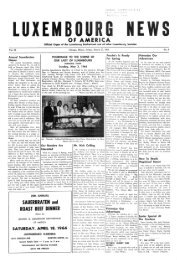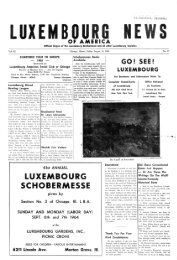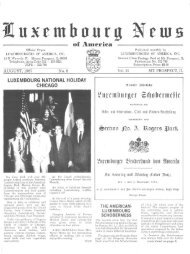$150.00 - Luxembourg American Heritage Information Center
$150.00 - Luxembourg American Heritage Information Center
$150.00 - Luxembourg American Heritage Information Center
You also want an ePaper? Increase the reach of your titles
YUMPU automatically turns print PDFs into web optimized ePapers that Google loves.
In 1943, Section 3 member and Grand President Fred A. Gilson retired from the Grand<br />
Lodge. To succeed him as Grand President, the representatives at the 1943 Convention chose<br />
another Section 3 member, Perry Daubenfeld, as the Grand Lodge's llth President.<br />
Daubenfeld (married to Louise Stoerzbach) was born August 14, 1979 in Reckingen<br />
(Mersch), the son of Jean P. and Catherine Loesch Daubenfeld. In 1893, he immigrated to<br />
America and settled in Chenoa, Illinois. Several years later, on December 3,1900, Perry enlisted<br />
in the United States Marine Corps and saw active duty in Panama and in the Philippines. Upon<br />
discharge from the Marines, he returned to the states, married Louise Stoerzbach of Dixon,<br />
Illinois and raised two children, Alfred and Hilda.<br />
In 1916, Daubenfeld enlisted in the Army and joined General Pershing, First Lt. George S.<br />
Patton, Jr. and a fellow <strong>Luxembourg</strong>er, Harry Trausch, in the punitive expedition waged against<br />
Pancho Villa, on the Mexican border, in 1916.<br />
In 1917, with the rank of Captain, Daubenfeld was sent to France, where, under the<br />
leadership of Black Jack Pershing, he led the 132nd Infantry, 33rd Division into three major<br />
offensives, — the Somme, Ancre River and Meuse-Argonne. In the latter battle, Daubenfeld was<br />
gassed, the effects of which would last the remainder of his life.<br />
Upon his discharge from the Army in 1919, in an attempt to recover from his war injuries,<br />
Daubenfeld and his family moved to South Dakota. In 1925, the <strong>Luxembourg</strong> Government<br />
appointed him Consul of <strong>Luxembourg</strong>, with jurisdiction over the states of South Dakota,<br />
Nebraska, Colorado and Kansas. Notwithstanding his later return to Chicago, Daubenfeld<br />
retained this appointment until his death in 1945.<br />
After an extended visit to <strong>Luxembourg</strong>, which lasted from September, 1924 to December,<br />
1926, Daubenfeld returned to Chicago and rejoined the U.S. Postal Service and Section 3.<br />
By 1935, Daubenfeld was a Trustee of Section 3, a post he would hold until his election as<br />
Grand President in May 1943 succeeding Fred Gilson. In January, 1945, Perry Daubenfeld<br />
succumbed to a heart attack. As a tribute to his service to his adopted country, Perry Daubenfeld<br />
was accorded a full dress military funeral, at which the <strong>Luxembourg</strong> government was represented.<br />
The L.B.A. lost a valuable member and a wonderful friend.<br />
In 1951 Al Ammon was President of Section 3. The officers of the Schobermesse Committee<br />
were: Leo Eschette, Chairman; Peter J. Mersch, Financial Secretary; Peter P. Michelau,<br />
Secretary and Ernest Brunder, Treasurer. The program book was devoted to a lengthy article on<br />
"<strong>Luxembourg</strong>'s Foreign Policy" by Joseph Beck.<br />
In 1953, the gold covered Schobermesse Book indicated the 50th Anniversary of the fall<br />
festival. Al Ammon continued as president of the Section and Leo Eschette continued as<br />
chairman of the Committee. Mr. Gilson wrote an article, "<strong>Luxembourg</strong> Golden Jubilee<br />
Schobermesse — Reminiscences of 50 Years." This work highlights section activities over the<br />
fifty year period and is a source of valuable information.<br />
Periodically, in the history of the L.B.A. it has become necessary to either merge or dissolve<br />
sections of the Brotherhood. Although the death of an individual section can be a source of pain,<br />
it can also be a source of strength, as the surviving section receives a transfusion of new members,<br />
ideas and energies. On July 3, 1954, Section 9 was merged into Section 3, and Section 9's gift to<br />
Section 3 were many members who would give it leadership in the future, including Harry<br />
Trausch and Nicholas Colling.<br />
Harry Trausch (married to Margaret Decker) was born in Bourscheid, <strong>Luxembourg</strong> on<br />
September 23, 1892. In 1913, he and his older brother, John, immigrated to America and found<br />
their way to Chicago. Once Harry gained command of the English language, he joined the U.S.<br />
Army in order to gain <strong>American</strong> citizenship. Not only did Harry obtain the valued citizenship,<br />
he earned a stay on the Mexican border with General Pershing, First Lt. G.S. Patton, Jr. and<br />
Perry Daubenfeld, chasing Pancho Villa. Like his future L.B.A. comrade, Trausch was discharged<br />
from the Army, only to re-enlist for World War I. Upon his discharge from that conflict, he joined<br />
the postal service and remained with it until his retirement, in 1954.<br />
70





